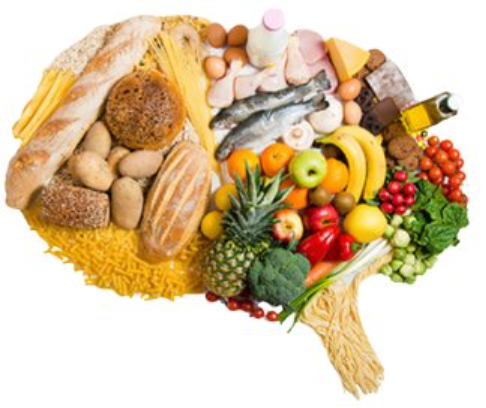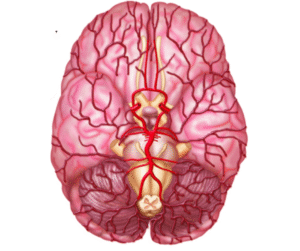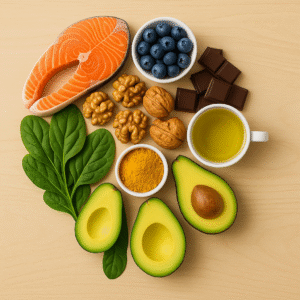Enhance Your Cognitive Future: The Role of Nutrition in Brain Health
As we transition into our 30s and beyond, our brains undergo subtle yet significant transformations. Notably, the hippocampus, the vital hub for our memories, begins to experience gradual shrinkage. Additionally, the production of neurotransmitters starts to decline, and the overall blood circulation to the brain is reduced. These changes can manifest as occasional forgetfulness, slower cognitive processing, and difficulties in multitasking. While experiencing mild cognitive slowing can be a natural aspect of aging, enduring severe cognitive decline is not an inevitable outcome. Understanding these shifts is crucial for implementing effective strategies to maintain brain vitality.
To preserve and enhance brain function, adopting a diet tailored for brain health is of paramount importance. Groundbreaking studies suggest that specific foods can protect against age-related brain changes, enhance memory retention, and stimulate new neural growth. By providing your brain with essential nutrients, you not only slow the decline but also cultivate a more resilient and adaptable mind capable of thriving at any stage of life.
This transformative journey is not solely about prevention; it’s about seizing control of your cognitive destiny. Each meal offers a golden opportunity to sharpen focus, strengthen neural pathways, and secure your cognitive future. Let us explore the profound impact that embracing a brain-healthy diet can have on the longevity and vitality of your mind.
Prefer to listen? Click below
Investigating the Intricate Link Between Nutrition and Brain Ageing

Examining How Dietary Choices Affect Brain Ageing
Cutting-edge research in the realm of nutritional neuroscience has uncovered that our dietary selections significantly influence the speed and extent of brain ageing. The foods we consume daily do more than merely provide energy; they actively shape the structure and functionality of our brain through a variety of biological mechanisms. This understanding highlights the importance of making informed dietary choices to support cognitive health as we age.
Facilitating Lifelong Learning via Neuroplasticity
One crucial domain where diet plays a pivotal role is in sustaining neuroplasticity, the brain’s remarkable ability to create new neural connections throughout life. This process is essential for learning and memory retention and is bolstered by nutrients such as omega-3 fatty acids and flavonoids. These nutrients promote the synthesis of brain-derived neurotrophic factor (BDNF), a vital protein that fosters neuron growth and enhances the adaptability of synapses, making the brain more resilient to challenges.
Fighting Inflammation: The Hidden Catalyst of Cognitive Decline
The impact of diet on neuroinflammation is profound, as chronic low-grade inflammation in the brain can speed up neurodegeneration. Certain foods, particularly those high in refined sugars and unhealthy fats, can trigger inflammatory responses that gradually damage neurons. In contrast, anti-inflammatory components found in foods such as fatty fish, berries, and leafy greens can help counteract this detrimental inflammation, promoting a healthier brain environment.
Shielding Against Free Radicals: The Vital Role of Antioxidants
Oxidative stress is another significant factor contributing to brain ageing. Due to its high metabolic activity, the brain is particularly vulnerable to damage from free radicals, which can lead to neuronal cell death. Foods abundant in antioxidants, such as dark chocolate, vibrant berries, and green tea, contain protective compounds that neutralise these harmful free radicals, acting as a natural barrier for the brain’s delicate cells.
The Gut-Brain Connection: How Your Microbiome Affects Mental Clarity
One of the most fascinating areas of research is the gut-brain axis, where our digestive microbiome produces neurotransmitters and other compounds that directly impact brain function. A diet rich in fermented foods and prebiotic fibre nourishes beneficial gut bacteria, which in turn generate mood-enhancing substances like serotonin and GABA. In contrast, an imbalanced gut microbiome has been linked to increased risk of neurodegenerative diseases, underscoring the importance of gut health for cognitive function.
These interconnected mechanisms—neuroplasticity, inflammation control, oxidative stress management, and gut-brain communication—provide a scientific foundation for how targeted nutrition can effectively mitigate cognitive decline and potentially enhance brain functionality as we age.
Exploring the Food-Mind Relationship: The Impact of Nutrients on Cognitive Function
Every meal we consume represents a significant choice—to either nourish the intricate networks of our brains or gradually impair their function through poor dietary selections. The relationship between food and cognition is not merely theoretical; specific nutrients exert a direct influence on the brain’s biochemistry, structure, and resilience in substantial, measurable ways.
Fortifying Neuronal Cell Membranes for Optimal Function
The delicate fatty membranes that facilitate communication between cells are essential for protecting the brain's neurons. Omega-3 fatty acids, particularly DHA, found in fatty fish, walnuts, and flaxseeds, serve as crucial components for these membranes. A diet abundant in healthy fats ensures that neurons remain flexible and effective in signal transmission, while deficiencies can lead to weakened cell structures and impaired cognitive capabilities, highlighting the necessity of adequate dietary intake.
Enhancing Neurotransmitter Production for Improved Communication
Neurotransmitters, the brain’s chemical messengers, rely on specific nutrients for their synthesis. Choline, which is plentiful in egg yolks, liver, and soybeans, is a prime example, serving as the foundational material for acetylcholine, a neurotransmitter essential for memory formation and recall. Insufficient levels of choline can limit the brain’s capacity to maintain optimal levels of this crucial compound, potentially leading to memory lapses and difficulties in maintaining concentration.
Enhancing Cerebral Blood Flow for Optimal Cognitive Performance
The brain consumes approximately 20% of the body's oxygen, despite representing only about 2% of its weight. Foods rich in nitrates, such as beets, spinach, and pomegranates, convert into nitric oxide within the body—a compound that dilates blood vessels and significantly enhances oxygen delivery to neural tissues. Improved blood flow not only supports essential brain function but is also associated with enhanced executive function and a slower cognitive decline in older adults, making these foods vital for maintaining mental acuity.
Activating Cellular Defence Mechanisms for Brain Protection
Specific plant compounds can initiate advanced protective mechanisms at the cellular level. Sulforaphane, a potent compound found in broccoli, Brussels sprouts, and kale, activates the Nrf2 pathway, which regulates over 200 genes responsible for detoxification and antioxidant production. This natural defence system aids neurons in countering daily damage from environmental toxins and metabolic byproducts that could otherwise accelerate brain ageing.
Unlocking the Transformative Potential of Brain-Healthy Diets
An ever-growing body of research highlights how specific dietary patterns can profoundly influence long-term brain health. The MIND diet (Mediterranean-DASH Intervention for Neurodegenerative Delay), which combines elements from both the Mediterranean and DASH diets, has showcased remarkable outcomes. Longitudinal studies indicate that strict adherence to this dietary approach—rich in leafy greens, berries, nuts, and fatty fish—can reduce the risk of Alzheimer’s disease by up to 53%, offering protective benefits comparable to some pharmaceutical interventions.
What makes these findings even more compelling is their rapid timeline for effectiveness. Unlike medications that may take years to demonstrate benefits, dietary changes have shown measurable cognitive improvements—including enhanced verbal recall and processing speed—in as little as 6 to 12 months. This suggests that our brains remain exceptionally receptive to nutritional adjustments, even later in life, with advantages extending beyond mere disease prevention.
From Preservation to Cognitive Enhancement
While much emphasis is placed on preventing neurodegeneration, emerging evidence indicates that optimised nutrition can actively enhance cognitive function in healthy individuals:
Boosting Working Memory
Randomised controlled trials indicate that diets rich in anthocyanins (found in blueberries and blackberries) and omega-3 fatty acids can increase working memory capacity—the mental “workspace” used for reasoning and decision-making. Participants in a 2023 study exhibited 15-20% improvements in complex memory tasks after just six months of targeted dietary modifications.
Pharmaceutical-Grade Focus
 Certain nutrients demonstrate effects comparable to synthetic nootropics in their ability to enhance attention. The combination of cocoa flavonols (found in dark chocolate) and L-theanine (present in green tea) has been shown to induce alpha brain waves associated with relaxed alertness—a mental state akin to that elicited by some prescription focus medications but without adverse effects.
Certain nutrients demonstrate effects comparable to synthetic nootropics in their ability to enhance attention. The combination of cocoa flavonols (found in dark chocolate) and L-theanine (present in green tea) has been shown to induce alpha brain waves associated with relaxed alertness—a mental state akin to that elicited by some prescription focus medications but without adverse effects.
Stimulating Neurogenesis
Contrary to previous assumptions, adult brains can generate new neurons through a process known as hippocampal neurogenesis. Compounds like curcumin (found in turmeric) and resveratrol (found in red wine) activate genetic pathways that support this regeneration. Animal studies suggest that these foods may elevate neuron production by 30-40% in critical memory regions, showcasing the potential of diet in promoting cognitive resilience.
Redefining Brain Health: A Pro-Longevity Perspective
The emerging field of cognitive nutrition transcends simplistic “anti-aging” concepts to propose a more powerful idea: active brain longevity. This perspective involves not only slowing deterioration but also equipping your neural framework with the biochemical resources necessary to sustain—and potentially enhance—its functionality over decades. Much like upgrading a computer's hardware while continually optimising its software, the right nutrients provide both structural support and functional enhancement to your brain's intricate networks.
Unveiling the Cellular Mechanisms of Brain-Boosting Nutrients
The most impactful brain foods do more than merely provide nourishment; they actively transform your neural biology at the cellular level. Here’s how these nutritional powerhouses operate within your cells:
Epigenetic Modulators: How Nutrition Influences Your Brain’s Longevity Blueprint
Certain potent compounds in food act as genetic engineers for your brain, modulating how your DNA expresses itself without altering the fundamental code. At the forefront are curcumin (the golden pigment in turmeric) and EGCG (the powerful antioxidant in green tea), which serve as master regulators of your cellular ageing processes.
These nutritional champions activate SIRT1, often referred to as the “longevity gene.” This is the same survival pathway triggered by calorie restriction and vigorous exercise—a biological switch known to extend cellular lifespan while enhancing DNA repair mechanisms. Imagine these compounds as tiny maintenance crews consistently repairing the frayed edges of your genetic material.
Moreover, clinical studies indicate that they can boost the production of BDNF (brain-derived neurotrophic factor) by up to 50%. BDNF acts as a fertiliser for your neurons, promoting the growth of new brain cells while fortifying existing connections. This explains why populations that regularly consume these foods exhibit a slower rate of age-related cognitive decline.
 Crucially, these compounds inhibit the NF-kB pathway, a significant inflammatory trigger in the brain. Chronic neuroinflammation is akin to rust gradually deteriorating neural networks; these dietary compounds serve as protective coatings. Remarkably, these epigenetic changes create lasting effects. Even after the compounds leave your system, the beneficial alterations to your gene expression patterns persist, similar to how a healthy habit yields dividends long after it is established.
Crucially, these compounds inhibit the NF-kB pathway, a significant inflammatory trigger in the brain. Chronic neuroinflammation is akin to rust gradually deteriorating neural networks; these dietary compounds serve as protective coatings. Remarkably, these epigenetic changes create lasting effects. Even after the compounds leave your system, the beneficial alterations to your gene expression patterns persist, similar to how a healthy habit yields dividends long after it is established.
This is not mere theory. Populations consuming diets rich in epigenetic modulators demonstrate these advantages distinctly. For instance, Okinawans consistently incorporate turmeric into their meals, while Japanese monks often enjoy matcha. These communities exemplify how nutrition can influence brain health, maintaining cognitive vitality for decades longer than average.
Mitochondrial Optimisers: Energising Your Brain’s Powerhouses
Powering Thought: The Brain’s Cellular Energy Requirements
Deep within every brain cell lie tiny power plants known as mitochondria, which tirelessly generate ATP—the molecular currency that fuels every thought, memory, and decision. Much like any high-performance engine, these cellular batteries require premium fuel and regular maintenance. This is where specific brain-enhancing nutrients come into play.
PQQ: Constructing and Repairing Your Brain’s Energy Factories
Pyrroloquinoline quinone (PQQ), an extraordinary compound found in kiwifruit, parsley, and beets, acts as a master mechanic for mitochondria. It not only optimises existing mitochondria but also stimulates the formation of entirely new energy factories through a process known as mitochondrial biogenesis. Think of PQQ as both a construction crew erecting new power plants and a skilled electrician preventing dangerous energy outages in your neural networks.
 Beets and Greens: Nature’s Nitric Oxide Boosters
Beets and Greens: Nature’s Nitric Oxide Boosters
Dietary nitrates found in beets and leafy greens undergo a fascinating transformation in the body, converting into nitric oxide. This molecule acts like a turbocharger for cerebral blood flow, enhancing oxygen delivery to brain cells by up to 20%. This explains why beetroot juice has demonstrated the ability to enhance cognitive performance across various individuals, from students to seniors, within mere hours of consumption.
Alpha-Lipoic Acid: The Mitochondrial Defence and Repair Team
Completing this energy trio is alpha-lipoic acid, found abundantly in spinach and broccoli. This versatile nutrient serves as both a potent antioxidant and a metabolic multitool, efficiently recycling other antioxidants such as vitamin C and glutathione to form a protective barrier around delicate mitochondrial DNA. It’s akin to having an elite cleanup crew that simultaneously repairs damage while preventing new wear and tear on your neural power grid.
The cumulative impact of these mitochondrial optimisers manifests in noticeable improvements. Peer-reviewed studies reveal measurable enhancements in processing speed, mental resilience, and verbal fluency within weeks of increased consumption. Older adults who consistently incorporate these foods into their diets exhibit brain metabolism patterns resembling those of younger individuals, demonstrating that with the right nutritional support, your cognitive energy systems can maintain their youthful vitality well into later years.
Brainpower on a Plate: Insights from Traditional Diets
This mitochondrial nourishment clarifies why traditional diets that emphasise these foods—such as the nitrate-rich Eastern European borscht or the PQQ-packed Japanese persimmon and green tea combinations—are associated with remarkable cognitive longevity across generations. Your brain’s energy capacity is not predetermined; every bite of these powerful mitochondrial fuels dynamically influences it.
Synaptic Builders: How Nutrients Forge Better Brain Connections
The incredible capabilities of your brain—every memory formed, skill mastered, and creative insight—rely on the delicate interplay of 100 trillion synaptic connections. These microscopic bridges between neurons are not static; they are living, dynamic pathways that continuously reshape themselves based on experiences and, critically, nutritional intake.
Omega-3s: The Brain’s High-Speed Insulation
 At the core of this synaptic architecture are omega-3 fatty acids (DHA and EPA), which constitute nearly one-third of synaptic membranes. These specialised fats function as high-performance insulation for neural wiring, allowing for up to 20% faster electrical signalling between brain cells. Their unique molecular structure fosters exceptionally fluid membranes, enabling neurotransmitter docking sites to flex and adapt like finely-tuned machinery. This explains why populations with high seafood consumption consistently demonstrate superior cognitive processing speeds.
At the core of this synaptic architecture are omega-3 fatty acids (DHA and EPA), which constitute nearly one-third of synaptic membranes. These specialised fats function as high-performance insulation for neural wiring, allowing for up to 20% faster electrical signalling between brain cells. Their unique molecular structure fosters exceptionally fluid membranes, enabling neurotransmitter docking sites to flex and adapt like finely-tuned machinery. This explains why populations with high seafood consumption consistently demonstrate superior cognitive processing speeds.
Choline: The Unsung Architect of Memory and Structure
The construction of these synaptic connections heavily relies on choline, an essential nutrient found in egg yolks and liver. This unsung hero serves dual purposes: as a direct precursor for acetylcholine (the memory-forming neurotransmitter that is the first to decline in conditions like Alzheimer's) and as a foundational element for phospholipids that uphold synaptic structural integrity. Without sufficient choline, your brain struggles to maintain and repair these essential connections, akin to a construction site running short on critical materials.
Flavonoids: Nature’s Architects of Brain Structure
Perhaps most exciting are the flavonoids present in berries and cocoa, which act as expert architects for your neural networks. These compounds stimulate the growth of dendritic spines—the intricate branching structures that form the physical foundation of learning. Animal studies reveal that they can enhance synaptic density by an astonishing 25%, upgrading your brain's hardware to manage more complex information processing.
Neuroplasticity in Action: Fueling Brain Remodelling Through Nutrition
This continuous synaptic remodelling signifies the physical embodiment of neuroplasticity—the brain's lifelong ability to adapt and reshape itself. The implications are transformative: while cognitive decline was once perceived as unavoidable, we now comprehend that targeted nutrition can foster what neuroscientists refer to as “cognitive reserve.” This protective buffer of additional neural connections and alternative pathways elucidates why some individuals maintain crystal-clear cognition into their 90s, while others with similar genetic backgrounds struggle prematurely.

The variance often lies in these synaptic building blocks. Consider the sharp-minded Mediterranean elders whose diets are abundant in omega-3-rich fish and choline-packed eggs, or the cocoa-consuming Kuna islanders, known for their remarkably low rates of age-related cognitive decline. Their eating habits do more than simply slow deterioration—they actively construct more resilient and adaptable neural networks capable of withstanding the trials of time. Every meal truly becomes an opportunity to enhance your brain's wiring.
Essential Nutrients for Optimal Cognitive Performance
To fully grasp how certain foods contribute to cognitive health, it’s essential to identify the key nutrients that serve as foundational elements for a sharp and resilient mind. These compounds work synergistically to protect, repair, and enhance your brain's intricate networks.
Omega-3 Fatty Acids: The Structural Backbone of the Brain
The long-chain omega-3s DHA and EPA are essential components of neuronal membranes, comprising approximately 30% of the brain's fatty acids. DHA, in particular, provides structural integrity to brain cells, facilitating flexible and efficient communication between neurons. These fats also act as powerful anti-inflammatory agents, helping to reduce chronic neuroinflammation that can hasten cognitive decline. Research indicates that individuals with higher omega-3 levels tend to experience increased brain volume in memory-related areas as they age.
Antioxidants: The Brain’s Natural Defence System
The brain's high metabolic activity renders it especially susceptible to oxidative damage caused by free radicals. Flavonoids (found in berries and dark chocolate), polyphenols (abundant in tea and coffee), and lycopene (concentrated in tomatoes) function as nature's protective network. These compounds neutralise harmful free radicals while activating the body's antioxidant systems. Some particularly potent antioxidants, such as EGCG in green tea, can even cross the blood-brain barrier to protect vulnerable neurons directly.
Choline: The Precursor to Memory Molecules
This often-overlooked nutrient serves as the raw material for acetylcholine, one of the most vital neurotransmitters for memory formation and recall. The brain's demand for choline is so significant that when dietary intake is insufficient, the body begins breaking down neuronal membranes to access stored choline. Adequate choline intake is crucial for everything from learning new information to maintaining focus during mentally demanding tasks.
The B Vitamin Complex: Support Crew for Cognitive Health
Each B vitamin contributes uniquely yet interdependently to brain health:
- B9 (folate) and B12 work in tandem to regulate homocysteine, an amino acid that, when elevated, can damage blood vessels and accelerate brain atrophy.
- B6 serves as a cofactor in producing various neurotransmitters, including serotonin and dopamine.
- B3 (niacin) facilitates cellular energy production in neurons.
Collectively, these vitamins help maintain healthy blood flow to the brain while supporting the biochemical reactions essential for cognitive sharpness.
Vitamin E and Magnesium: Guardians of Neural Health
Vitamin E is the brain's primary fat-soluble antioxidant, shielding the delicate polyunsaturated fats in neuronal membranes from oxidative damage. Magnesium plays an equally vital role as a regulator of synaptic plasticity—the mechanism underlying learning and memory. This mineral also helps control the brain's NMDA receptors, preventing the type of over-excitation that could lead to neuronal damage over time.
What makes these nutrients particularly potent is their synergistic effects. For instance, vitamin E collaborates with omega-3s to protect neuronal membranes, while magnesium regulates the same neurotransmitter systems that rely on sufficient B vitamins. This interconnected network of nutritional support emphasises why a varied, nutrient-rich diet achieves superior results compared to focusing on any individual compound in isolation.
The Ultimate Brain-Boosting Foods: An In-Depth Analysis

Fatty Fish & Seafood: Nature's Optimal Brain Nutrition
Cold-water fatty fish serve as the richest sources of omega-3 fatty acids. Varieties like salmon, mackerel, and sardines are especially abundant in DHA and EPA. Your body readily absorbs these forms, making them highly bioavailable. These essential fats are incorporated directly into neuronal membranes, enhancing cell fluidity and communication. Smaller fish such as anchovies and sardines offer distinct advantages, as they occupy lower positions in the food chain and accumulate fewer heavy metals. Moreover, they provide more beneficial fats. Shellfish, including oysters, bring additional nutrients, such as zinc and vitamin B12, which help sustain myelin sheaths that insulate nerve fibres. For alternatives, consider cod liver oil, which is a potent source of omega-3s and vitamin D, both in highly absorbable forms.
Vibrant Berries: The Brain's Antioxidant Riches
Darkly coloured berries provide more than just aesthetic appeal; their rich anthocyanin content grants them exceptional neuroprotective properties. Blueberries, in particular, have exhibited remarkable efficacy in human studies, showcasing improved memory function in older adults who consume them regularly. Pomegranates contain unique compounds called ellagitannins, which your body converts into molecules capable of crossing the blood-brain barrier. Tart cherries offer powerful anti-inflammatory benefits that may help protect the brain and slow neurodegenerative processes. Fresh or frozen berries retain these benefits most effectively, as drying often concentrates sugars while degrading delicate phytochemicals.
Leafy Greens & Cruciferous Vegetables: The Brain’s Detox Allies
The deep green pigments in spinach and kale signify their high concentrations of essential brain nutrients like folate and vitamin K. These compounds work synergistically to support methylation processes essential for neurotransmitter synthesis and DNA maintenance. Cruciferous vegetables such as broccoli and Brussels sprouts contain sulforaphane, a sulfur compound that activates the body's natural detoxification systems. Regular consumption of these vegetables is correlated with slower cognitive decline in longitudinal studies. Beets are noteworthy for their high nitrate content, which your body converts into nitric oxide, improving blood flow to the brain and delivering additional oxygen to the neurons that require it most.
Nuts & Seeds: Concentrated Nutritional Powerhouses
Among nuts, walnuts stand out for their unique neuroprotective profile. They contain plant-based omega-3s, melatonin, and polyphenols. Pumpkin seeds provide a mineral trio of zinc, magnesium, and iron, all of which are critical cofactors in enzymatic reactions vital for memory and learning. Flaxseeds and chia seeds contain alpha-linolenic acid (ALA), a plant-based omega-3 fat that the body can partially convert into DHA and EPA. Additionally, these seeds deliver soluble fibre that nourishes beneficial gut bacteria, indirectly supporting brain health via the gut-brain axis.
Pumpkin seeds provide a mineral trio of zinc, magnesium, and iron, all of which are critical cofactors in enzymatic reactions vital for memory and learning. Flaxseeds and chia seeds contain alpha-linolenic acid (ALA), a plant-based omega-3 fat that the body can partially convert into DHA and EPA. Additionally, these seeds deliver soluble fibre that nourishes beneficial gut bacteria, indirectly supporting brain health via the gut-brain axis.
Eggs & Lean Proteins: Essential Building Blocks for Neurotransmitters
Egg yolks are among the richest dietary sources of choline, a precursor for the memory-critical neurotransmitter acetylcholine. The phospholipids in eggs also contribute to maintaining healthy neuronal membranes. Poultry such as turkey and chicken provide high-quality protein, containing all essential amino acids required by the brain for neurotransmitter synthesis. These meats also deliver B vitamins, which support energy metabolism in brain cells, along with highly bioavailable forms of iron and zinc, minerals essential for oxygen transport and neural signalling.
Fermented Foods: Nurturing the Gut-Brain Connection
Traditional fermented foods like yoghurt, kefir, and kimchi contain live cultures that promote a healthy gut microbiome. This microbial ecosystem generates neurotransmitters and neuroactive compounds that directly influence brain function. Fermented soy products, such as tempeh, offer additional benefits, as they are rich in NMN (nicotinamide mononucleotide), a powerful compound that plays a key role in cellular energy production and supports DNA repair. Regularly consuming these probiotic-rich foods may help modulate inflammation and enhance stress resilience through the gut-brain axis.
Quality Fats & Oils: Liquid Protection for Your Brain
Extra virgin olive oil contains oleocanthal, a phenolic compound with documented anti-inflammatory effects akin to ibuprofen. Its monounsaturated fats promote healthy blood flow while safeguarding against vascular dementia. Avocados provide an exceptional combination of monounsaturated fats and vitamin E, which helps preserve neuronal membranes from oxidative damage. When consumed together, these healthy fats facilitate the absorption of fat-soluble nutrients from other brain-healthy foods.
Herbs & Spices: Concentrated Neuroprotective Benefits
 In various studies, turmeric‘s active compound, curcumin, has demonstrated remarkable anti-inflammatory and amyloid-plaque-reducing effects. Rosemary contains carnosic acid, which helps protect the brain from free radical damage and may stimulate nerve growth factor production. Sage has exhibited acetylcholinesterase-inhibiting properties, similar to certain medications used for Alzheimer's disease. These potent botanicals can be easily incorporated into daily meals to offer cumulative brain benefits.
In various studies, turmeric‘s active compound, curcumin, has demonstrated remarkable anti-inflammatory and amyloid-plaque-reducing effects. Rosemary contains carnosic acid, which helps protect the brain from free radical damage and may stimulate nerve growth factor production. Sage has exhibited acetylcholinesterase-inhibiting properties, similar to certain medications used for Alzheimer's disease. These potent botanicals can be easily incorporated into daily meals to offer cumulative brain benefits.
Dark Chocolate & Tea: Natural Cognitive Enhancers
High-cocoa dark chocolate (85% cocoa or higher) provides flavonols that enhance cerebral blood flow and have been shown to improve neuroplasticity. The combination of moderate caffeine content and L-theanine in green tea creates a unique state of relaxed alertness, improving focus without the jitters. Matcha, a powdered form of green tea, offers even more concentrated benefits due to its whole-leaf consumption.
Mindful Indulgences: Wine & Coffee
Red Wine: The Benefits of Moderation
 Red wine contains resveratrol, a natural protective compound that helps shield brain cells from damage and may lower the risk of Alzheimer’s disease. Research indicates that a small glass per day—approximately 5 oz or 150 ml—may provide benefits without the risks associated with excessive alcohol intake.
Red wine contains resveratrol, a natural protective compound that helps shield brain cells from damage and may lower the risk of Alzheimer’s disease. Research indicates that a small glass per day—approximately 5 oz or 150 ml—may provide benefits without the risks associated with excessive alcohol intake.
However, excessive consumption of wine (or any alcohol) can produce adverse effects, harming memory and elevating dementia risk. Moderation is essential. Consider it a brain tonic rather than a daily indulgence.
Coffee: Your Morning Cognitive Booster
Coffee is more than just a wake-up beverage; it is rich in antioxidants that help combat brain ageing. Caffeine enhances focus, while compounds like chlorogenic acid may offer protection against neurodegenerative diseases. Research suggests that 2-3 cups of coffee daily (approximately 300mg of caffeine) is the optimal range for cognitive benefits.
However, akin to wine, more isn’t always better. Excessive coffee consumption, particularly later in the day, can lead to jitters, poor sleep, and increased anxiety—all of which can negatively affect brain health over time.
The Bottom Line
- Red wine: A small glass a few times a week may be beneficial, but it’s not advisable to start drinking solely for the health benefits.
- Coffee: Ideally, 2-3 cups daily is most beneficial; beyond that, the advantages diminish.
- Balance is crucial: Both beverages can provide brain benefits at moderate levels but can become detrimental in excess.
If you don’t consume alcohol or coffee, you can achieve similar benefits from other foods—like berries (for resveratrol) and dark chocolate or green tea (for caffeine alternatives).
Identifying Brain-Harming Foods: What to Avoid for Lasting Cognitive Health
Just as certain foods can sharpen your mind, others actively work against it—contributing to brain fog, memory lapses, and even increasing the risk of dementia over time. Understanding these dietary offenders empowers you to make wiser choices for lifelong mental clarity.
The Sugar Dilemma: How Sweets and Refined Carbs Cloud Your Cognitive Function
Foods such as white bread, pastries, sugary cereals, and soda cause rapid spikes in blood sugar, leading to more than just energy crashes. These continual surges generate chronic inflammation that gradually harms sensitive brain cells over time. Research indicates that individuals with high sugar diets tend to have smaller hippocampal volume—the brain's crucial memory centre. Some experts now refer to Alzheimer's disease as “Type 3 diabetes” due to the profound impact of sugar metabolism on brain health. Instead of processed carbohydrates, opt for whole grains like oats and quinoa that provide steady energy, or satisfy sweet cravings with antioxidant-rich berries and dark chocolate (85% cocoa or higher).
The Silent Threat of Trans Fats: Brain-Damaging Ingredients in Processed Foods
 Commonly found in fried foods (like French fries and doughnuts), margarine, and various packaged snacks (including crackers and microwave popcorn), trans fats can severely impair brain function. These artificial fats infiltrate neuron membranes, weakening brain cells and reducing their communication efficiency. Additionally, they elevate harmful LDL cholesterol levels, gradually obstructing the small blood vessels nourishing your brain. Population studies consistently reveal that individuals consuming higher amounts of trans fats perform worse on memory assessments and face elevated dementia risks. Healthier alternatives include cooking with olive oil or avocado oil and snacking on raw nuts, seeds, or fresh vegetables with hummus.
Commonly found in fried foods (like French fries and doughnuts), margarine, and various packaged snacks (including crackers and microwave popcorn), trans fats can severely impair brain function. These artificial fats infiltrate neuron membranes, weakening brain cells and reducing their communication efficiency. Additionally, they elevate harmful LDL cholesterol levels, gradually obstructing the small blood vessels nourishing your brain. Population studies consistently reveal that individuals consuming higher amounts of trans fats perform worse on memory assessments and face elevated dementia risks. Healthier alternatives include cooking with olive oil or avocado oil and snacking on raw nuts, seeds, or fresh vegetables with hummus.
Alcohol's Dual Nature: When Moderation Becomes Excess
While red wine offers beneficial resveratrol, the overall impact of alcohol on the brain follows a strict dose-response relationship. Excessive drinking is defined as more than one drink daily for women or two for men. Over time, it reduces brain volume, particularly in areas responsible for memory and decision-making. Alcohol disrupts the delicate balance of neurotransmitters, leading to mood fluctuations, focus issues, and memory gaps. Even moderate-heavy drinking correlates with earlier cognitive decline in long-term studies. For optimal brain health, consider minimising alcohol consumption and incorporating several completely alcohol-free days each week.
Protecting Your Cognitive Future
Your brain's vulnerability to poor dietary choices mirrors its responsiveness to nourishing foods. Reducing refined sugars can significantly enhance cognitive health. Avoiding trans fats and limiting alcohol consumption also fosters a healthier brain environment. Begin with simple substitutions: choose a handful of walnuts instead of that afternoon chocolate bar, or opt for air-popped popcorn instead of fried chips. These small changes can accumulate over time, preserving your memory, focus, and problem-solving skills for years to come.
Remember: Every meal represents a chance to either bolster or undermine your cognitive health. Through consistent, mindful decisions, you can maintain a sharp and resilient brain well into your advancing years.
Final Thoughts: Nurture Your Brain for a Brighter Future
The research is unequivocal. Your dietary choices and lifestyle habits affect more than just your physical health; they directly influence your brain’s vitality and longevity. The omega-3s in salmon help maintain neuronal flexibility, while the antioxidants in berries protect your brain from ageing. Each meal provides an opportunity to nurture your brain. Every bite is an investment in your cognitive future.
However, it’s essential to remember that no single food or habit serves as a miracle solution. The true power lies in combining these strategies:
- A colourful, whole-food diet rich in brain-boosting nutrients.
- Consistent hydration, physical activity, and quality sleep.
- Regular mental challenges and effective stress management.
The best part? It’s never too late to begin. Whether you’re 30 or 70, your brain stands to gain from these dietary and lifestyle adjustments. Numerous studies indicate improvements in memory and focus can occur in as little as 6-12 weeks following dietary changes.
Consider this: You’re not just eating for the present moment. You’re feeding the 90-year-old version of yourself—one who still wants to remember names, engage in conversations, and maintain independence. That future is being crafted, bite by bite, habit by habit, starting today.
So, choose one brain-healthy swap this week—perhaps a handful of walnuts instead of chips, or a stroll after dinner instead of scrolling through your phone. Small actions can accumulate into a lifetime of sharper thinking. Your brain is counting on your choices!
The Article: Eating for Brain Health: The Best Foods to Slow Cognitive Decline appeared first on https://janestevensnutrition.com
The Article Foods for Brain Health: Top Choices to Combat Cognitive Decline Was Found On https://limitsofstrategy.com

